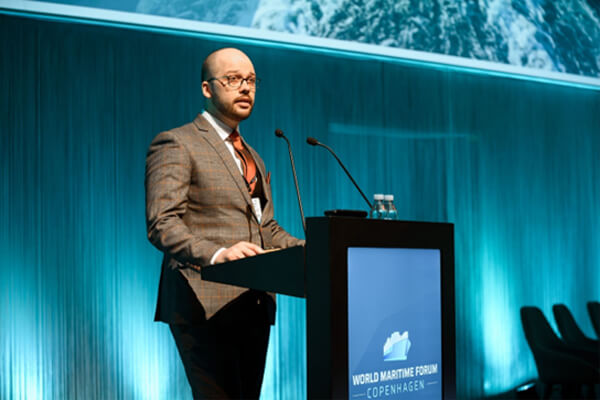Third Hamburg Maritime Forum to Address Future Maritime Concerns

The Hamburg Maritime Forum 2024, now in its third edition, is set to convene on April 16th and 17th, bringing together 500 maritime professionals at the forefront of industry innovation. Held at the historic Altonaer Fischauktionshalle, this forum promises a transformative dialogue, tackling pressing concerns such as decarbonization strategies and prioritizing seafarers' safety and wellbeing. These discussions underscore the industry's shared commitment to steering towards a more sustainable and socially responsible future.
The significance of this event to the maritime industry cannot be overstated. As the world faces escalating environmental challenges, the imperative for sustainable practices within maritime operations has never been more pressing. The forum provides a crucial platform for stakeholders to collaborate, share insights, and develop actionable strategies to mitigate the industry's environmental impact while ensuring its long-term viability.
The venue - Altonaer Fischauktionshalle, steeped in maritime history, provides an apt backdrop for these discussions. As a symbol of Hamburg's maritime heritage, the venue underscores the forum's connection to the industry's rich legacy while emphasizing its forward-looking focus on innovation and progress. Against this historic backdrop, attendees are inspired to honor tradition while embracing change, fostering a dynamic exchange of ideas and perspectives.
Among the forum's focal points is the exploration of new frontiers in maritime technology, with a particular emphasis on artificial intelligence (AI). AI holds immense promise for revolutionizing various aspects of maritime operations, from predictive maintenance to autonomous navigation. By harnessing the power of AI-driven solutions, the industry can enhance efficiency, safety, and sustainability, paving the way for a new era of maritime excellence.
Amid the transformative currents reshaping the maritime industry, Oliver-Andreas Leszczynski, a distinguished AI strategist and industry specialist, casts a visionary perspective on the role of Artificial Intelligence (AI) as a pivotal enabler and game-changer. Leszczynski contends that AI transcends its role as a mere technological advancement, positioning itself as a fundamental booster for the maritime sector at large. His views are predicated on the belief that AI can revolutionize traditional maritime operations, ushering in an era of unprecedented efficiency, safety, and sustainability.
Leszczynski emphasizes that AI's potential to enhance decision-making processes through predictive analytics and real-time data interpretation can significantly mitigate risks, optimize routing, and improve fuel efficiency, directly contributing to the industry's decarbonization goals. Moreover, he highlights the transformative impact of AI in automating complex operational tasks, from cargo handling to vessel maintenance, which not only streamlines workflows but also elevates safety standards by minimizing human error.
Beyond operational efficiencies, Leszczynski sees AI as a catalyst for innovation, driving the development of autonomous ships and advanced navigation systems that promise to redefine maritime logistics. He argues that such advancements are not merely incremental improvements but represent a paradigm shift towards a smarter, more interconnected maritime ecosystem. This ecosystem, powered by AI, would not only enhance the competitiveness of maritime businesses but also foster a more sustainable and socially responsible industry.
In advocating for the adoption of AI, Leszczynski underscores the importance of a collaborative approach that harnesses the collective expertise of industry stakeholders, technology developers, and academic researchers. He believes that the successful integration of AI into maritime operations necessitates a concerted effort to address technological, regulatory, and ethical challenges. It is through this collaborative spirit and commitment to innovation that the maritime industry can truly harness the full potential of AI.

Leszczynski's forward-thinking approach calls for a reimagining of the maritime industry's future, one where AI acts not just as a tool but as a transformative force, propelling the industry towards a horizon of opportunity and growth. In his view, the maritime sector stands at the cusp of a new era, with AI serving as the key to unlocking unparalleled possibilities for efficiency, sustainability, and innovation.
In addition to his insights on the transformative role of AI within the maritime sector, Leszczynski delves into the opportunities AI presents for strengthening and revitalizing the shipbuilding industry in Europe. As a Global Lead for Artificial Intelligence in the shipbuilding industry, Leszczynski is at the forefront of integrating AI innovations to redefine the paradigms of ship design and construction, ensuring Europe's shipbuilding sector not only thrives but leads globally in innovation and sustainability.
Leszczynski argues that AI can significantly enhance the European shipbuilding industry by optimizing design processes, improving supply chain management, and facilitating the creation of smarter, more efficient ships. By leveraging AI-driven simulations and predictive analytics, shipbuilders can achieve unparalleled precision in design, reducing material waste and enhancing the performance of vessels. Furthermore, AI technologies enable real-time monitoring and predictive maintenance, which extends the lifespan of ships and reduces operational costs, making European shipbuilding more competitive on the global stage.
Moreover, Leszczynski points to the potential of AI in fostering innovation in sustainable shipbuilding practices. Through advanced data analytics and machine learning algorithms, shipbuilders can develop new materials and technologies that reduce the environmental impact of ships, aligning with the industry's decarbonization goals. This focus on sustainability not only revitalizes the shipbuilding industry but also positions Europe as a leader in eco-friendly maritime solutions.
The adoption of AI in shipbuilding also presents opportunities for workforce development and skill enhancement. Leszczynski emphasizes the need for a skilled workforce capable of working alongside AI technologies, highlighting the importance of investing in education and training programs. This approach ensures that the shipbuilding industry not only adapts to technological advancements but also fosters an environment of continuous learning and innovation.
In his commitment to advancing the maritime industry through AI, Leszczynski will share his expertise and vision at the Hamburg Maritime Forum 2024. His keynote speech on the topic of "AI Boosters for the Maritime Industry" promises to offer deep insights into how AI can serve as a catalyst for innovation, efficiency, and sustainability across the maritime and shipbuilding sectors. Leszczynski's participation underscores the forum's significance as a platform for sharing knowledge, fostering collaborations, and driving the industry forward in the face of global challenges.
In conclusion, the Hamburg Maritime Forum 2024 stands as a beacon of progress and collaboration in the maritime industry. By addressing critical topics such as sustainability, safety, and the frontier of AI, participants demonstrate their commitment to shaping a more resilient and responsible maritime future. Through dialogue, innovation, and strategic partnerships forged at this forum, the industry is poised to navigate the challenges ahead with confidence and purpose.
3rd Hamburg Maritime Forum
Dates: April 16 and 17, 2024
Venue: Altonaer Fischauktionshalle, Große Elbstraße 9, 22767 Hamburg, Germany
Organizer: IGGS Group
Website: https://hamburgmaritimeforum.com/

that matters most
Get the latest maritime news delivered to your inbox daily.
This article is sponsored by the IGGS Group.
The opinions expressed herein are the author's and not necessarily those of The Maritime Executive.
